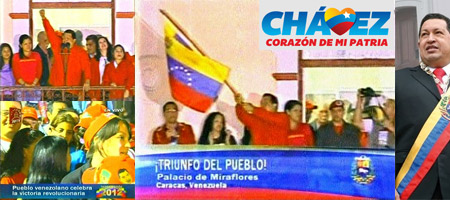Chavez Wins Re-Election in Venezuela
October 9, 2012

The unprecedented 80.94% turnout highlighted the adequacy of the unique course Venezuela pursued under Chavez since he rose to power in 1999 – a combination of strong modernization policies, staunch sovereignty and immunity to pressure internationally, and the diversion of oil revenues towards maximally inclusive welfare programs. As the leader of the country sitting on some of the world's biggest energy reserves, Chavez does not have to flirt with the domestic oligarchy or bow to Washington. He confidently won the race against Henrique Capriles Radonski who polled 44.5% riding on a thinly disguised anti-national platform and, if elected, would have axed the social benefits for the population, said No to Latin America's alliance-building and initiated a creeping privatization across the Venezuelan energy sector.
At the moment the supporters of Chavez can pride themselves in winning a tight competition. The intensity of the Western anti-Chavez propaganda which has never been gentle to the defiant Venezuelan leader peaked days ahead of the crucial October 7 date. Contrary to completely reliable surveys, the media at the time churned out poorly sourced reports that Radonski, an energetic campaigner with scores falling considerably short of Chavez's, was closing the gap and might eventually prevail. Quite a few of Russia's liberal media outlets, by the way, eagerly echoed the claims. Back in the epoch of Chavez's first presidency, the political establishment in Russia was slow to appreciate the opportunities which began to arise with Venezuela's shift to populism. The Yeltsin-era inertia and the approaches adopted when A. Kozyrev ran the Russian foreign ministry in 1991-1995 – a diplomacy creed acknowledging unlimited US primacy and leading Russia to serially sacrifice its own interests - dominated Moscow's foreign-policy thinking, but it transpired in a fairly short time that Chavez entered the world political stage with far-reaching and absolutely real plans. Moscow therefore had to open a dialog with Chavez and finally put together a viable cooperation agenda.
As of today, the partnership between Russia and Venezuela is pattern-setting for Latin America and beyond. Moscow and Caracas interact in the spheres of energy, arms business, trade, finances, etc., and, importantly, Chavez's commitment to friendship with Russia is absolute. The position, in fact, exposes Chavez to additional criticisms in the Western and Russian liberal media which evidently feel upset that the cooperation between Russia and Venezuela is on the rise. It should not fly below the radar that, implicitly, the outpourings of invective against Chavez oftentimes target Russian President V. Putin as the attempts to drive Moscow from Caracas gain momentum.
The early-starters in the pro-Western media already took to re-painting the picture of the Venezuelan elections to Washington's liking, feeding to the audiences the ridiculous accounts that – according to surveys cited but not identified – Radonski's score was below that of the incumbent by less than a percent and somehow fit into the ballot-counting error margin. Originally, the allegations of vote-rigging were supposed to be the first step in the framework of a scenario meant to culminate in an outbreak of street unrest in Venezuelan cities, but the landslide victory Chavez added to his record rendered the blueprint impractical. No doubt, under less favorable circumstances the Venezuelan radical opposition would have unleashed a violent offensive against the regime, sending its gangs trained with the CIA and USAID financial assistance into the fight for the interests of the influential foreign patrons. “Chavez will now have a freer hand to push for an even bigger state role in the economy and continue populist programs. He pledged before the vote to make a stronger push for socialism in the next term. He's also likely to further limit dissent and deepen friendships with U.S. rivals”, wrote Associated Press contributor Ian James. The above provides a good idea of the grievances list which causes Washington to regard Chavez as the number one enemy in Latin America.
Radonski simply had to concede victory to Chavez and refrain from the traditional rhetoric about suspected vote-fixing. First, the present-day ballot-casting routine in Venezuela is completely secure and even includes fingerprint scans taken from those who come to the booths. Secondly, now the opposition is bracing for an electoral battle as state governors and legislators are to be elected in December. The tactic Chavez's opponents are switching to is to muscle the populist regime on the regional level. The opposition is already in control of Zulia, Táchira, and Nueva Esparta. In part, the window of opportunity opens up for the opposition since in a number of cases the pro-Chavez governors do not measure up to the standards Caracas is trying to set, and, locally, ills like corruption, inefficiency, and demagoguery do erode the foundations of the Venezuelan authority. The situation further deteriorated when Chavez was struggling with cancer and his grip on the government and the United Socialist Party weakened temporarily.
It is clear that Chavez has virtually no time to celebrate the triumph. What he faces as the dust settles is a new phase in championing his cause, the challenges being to safeguard the political gains domestically and internationally.